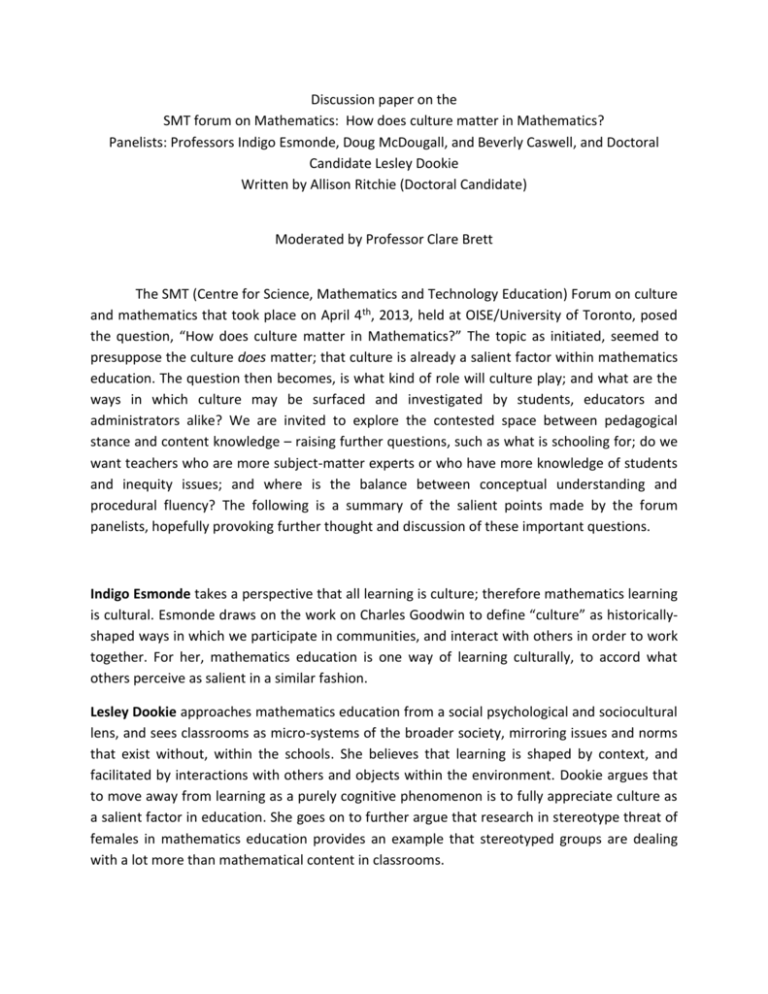Discussion Paper on SMT Forum on Mathematics - OISE
advertisement

Discussion paper on the SMT forum on Mathematics: How does culture matter in Mathematics? Panelists: Professors Indigo Esmonde, Doug McDougall, and Beverly Caswell, and Doctoral Candidate Lesley Dookie Written by Allison Ritchie (Doctoral Candidate) Moderated by Professor Clare Brett The SMT (Centre for Science, Mathematics and Technology Education) Forum on culture and mathematics that took place on April 4th, 2013, held at OISE/University of Toronto, posed the question, “How does culture matter in Mathematics?” The topic as initiated, seemed to presuppose the culture does matter; that culture is already a salient factor within mathematics education. The question then becomes, is what kind of role will culture play; and what are the ways in which culture may be surfaced and investigated by students, educators and administrators alike? We are invited to explore the contested space between pedagogical stance and content knowledge – raising further questions, such as what is schooling for; do we want teachers who are more subject-matter experts or who have more knowledge of students and inequity issues; and where is the balance between conceptual understanding and procedural fluency? The following is a summary of the salient points made by the forum panelists, hopefully provoking further thought and discussion of these important questions. Indigo Esmonde takes a perspective that all learning is culture; therefore mathematics learning is cultural. Esmonde draws on the work on Charles Goodwin to define “culture” as historicallyshaped ways in which we participate in communities, and interact with others in order to work together. For her, mathematics education is one way of learning culturally, to accord what others perceive as salient in a similar fashion. Lesley Dookie approaches mathematics education from a social psychological and sociocultural lens, and sees classrooms as micro-systems of the broader society, mirroring issues and norms that exist without, within the schools. She believes that learning is shaped by context, and facilitated by interactions with others and objects within the environment. Dookie argues that to move away from learning as a purely cognitive phenomenon is to fully appreciate culture as a salient factor in education. She goes on to further argue that research in stereotype threat of females in mathematics education provides an example that stereotyped groups are dealing with a lot more than mathematical content in classrooms. Beverly Caswell began by referencing her Inclusive Schools Project, in which she uses culturallyrelevant pedagogy as an entryway to help students gain access to higher mathematical thinking and discussion. Her view is that mathematics is a cultural practice and tool, for which individuals use to make sense of their world. Caswell’s example of a Multicultural Math Night to emphasize the contribution of non-Western thinkers to mathematics education and inquiry, student-led projects illustrated her point of honouring students’ lives and cultures. She points out that students seemed honoured to learn about significant contributions made by people represented in their cultural background, and in turn, motivated them to learn about historical contexts as well as mathematical content, leading them to ask questions about big ideas and create their own curriculum. Doug McDougall began by talking about his early days as a mathematics teacher, and his efforts to try to get students see the value in mathematics as a subject. For him, mathematics as a culture and the role of culture in mathematics are two separate issues. He maintains that mathematics as a culture is to something that is learned; one who adopts the skills and norms becomes an insider to that community, and hence is successful in mathematics. In contrast, the role of culture in mathematics is understand that there are a variety of worldviews that exist outside the classroom, and in turn, these perspectives influence how individuals view mathematics. He ends with an attempt to merge the two areas, by posing the question of how might educators better understand other worldviews in the classroom, in order to support different ways of entering this mathematics community? Arif Anwar, a doctoral candidate and audience member posed the question of whether there is one mathematics and multiple ways to get an answer, or multiple mathematics. The panelists succeeded in excitedly deliberating and stretching the scope of the discussion to involve the influence of school culture on mathematics education; to incorporate the needs of the students; to question the kind of community teachers are creating. The forum challenged the “culture of success” in schools and set of assumptions individuals have a tendency to make in mathematics, and reiterated the idea that we, as researchers and educators, have a responsibility to rather, create a culture of inclusivity and inquiry, by providing alternative entryways to know and understand the subject matter. mathematics, as a named and static concept, encapsulates but one worldview. With their different perspectives, the panelists expanded on mathematics as a skilled-based concept; a procedural practice; a gatekeeping tool; and as epistemically- and culturally-situated knowledge. As a result, the forum provided a place for beginnings in which to understand mathematics as all these things.








